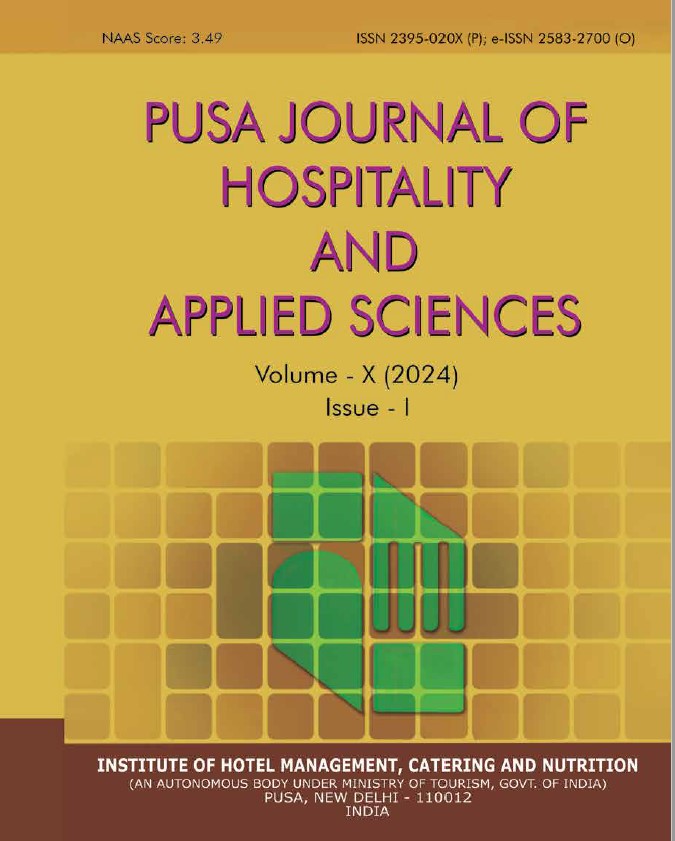Barriers and Catalysts of Entrepreneurial Success in the Hospitality Industry: A Mixed-Method Analysis
DOI:
https://doi.org/10.48165/pjhas.2025.11.1.8Keywords:
Entrepreneurs, hospitality, entrepreneurial barriers, government incentives, workforce challengeAbstract
Background: The hospitality sector, a significant global economic driver, faces numerous challenges including regulatory hurdles, financial constraints and workforce shortages, particularly in developing economies like India. Understanding the factors influencing entrepreneurial success in this sector is crucial for fostering sustainable growth. Objectives: This study aims to identify key barriers and catalysts affecting entrepreneurial activities in the hospitality industry and to analyse the internal factors such as entrepreneur’s diverse socio-economic and professional backgrounds that influences their journey and growth. Methodology: A mixed-method approach was employed, combining quantitative and qualitative data collection. An online survey with 11 closed-ended questions was distributed to 150 entrepreneurs in Mumbai and surrounding areas, resulting in 82 responses (55% response rate). Data collection technique used was convenience sampling. Additionally, in-depth interviews were conducted with 10 selected entrepreneurs. Quantitative data was analysed using descriptive statistics, while qualitative data was analysed through thematic analysis. Results: The study revealed that middle-level professionals with family business backgrounds are key drivers of entrepreneurship. 83% of respondents planned business expansion, with scalable ventures like cafes and food outlets being preferred due to lower capital requirements. 89% of respondents agreed that small businesses significantly enhance tourism. 63% agreed that management education develops business skills, but only a minority believed it adequately fosters creativity and innovation. 84% of respondents were flexible to relocate for business. Conclusion: The research highlights the critical role of family background, practical experience and adaptability in entrepreneurial success within the hospitality industry. While management education provides foundational skills, there is a need for enhanced focus on creativity and innovation. Government support, financial accessibility and infrastructure development are essential to mitigate barriers and foster a resilient entrepreneurial ecosystem.References
Aigbedo, H. (2021). Impact of COVID-19 on the hospitality industry: A supply chain resilience perspective. International Journal of Hospitality Management, 98, 103012. https://www.sciencedirect.
com/science/article/pii/S0278431921001559
Ayres, R. U., & Warr, B. (2009). The economic growth engine: how energy and work drive material prosperity. The Economic Growth Engine. Edward Elgar Publishing.
Bhamango, B., Khilari, S., Dabade, T., Hendre, A., Kale, R., & Brahme, A. (2024). Foresight and Formulate the Various IOT Security Models Used. Tourism and Hospitality. NATURALISTA CAMPANO, 28(1), 1422-
1431.
Chauhan, A. (2021). VUCA. Start-ups. Jaico Publishing House.
Dhaliwal, A. (2016). Role of entrepreneurship in economic development. International Journal of Scientific Research and Management, 4(6), 4262-4269.
Doctorow, C., & Giblin, R. (2022). Chokepoint Capitalism: How Big Tech and Big Content Captured Creative Labor Markets and How We’ll Win Them Back. Beacon Press.
Dychtwald, K., Erickson, T. J., & Morison, R. (2006). Workforce crisis: How to beat the coming shortage of skills and talent. Harvard Business Press.
EHL Insights. (2024). Hospitality Industry: All Your Questions Answered (2024 Update). Ehl.edu, EHL Holding SA. www.hospitalityinsights.ehl.edu/hospitality-industry
Elkington, J., & Hartigan, P. (2008). The power of unreasonable people: How social entrepreneurs create markets that change the world. Harvard Business Press.
Federation of Indian Chambers of Commerce and Industry (2023), Economic Outlook Survey.
Ghazi, S., Khalid, M. T., & Shah, S. M. A. (2024). Prime Minister’s Task Force for Import Substitutions and Export Promotion for Improving Balance of Trade. KJPP, 3(3), 261. http://www.nipapeshawar.gov.pk/KJPPM/PDF/
CIP/js2.pdf#page=271
HVS India Hospitality Industry Overview. (2023). www. hvs.com. https://www.hvs.com/article/9918-hvs-india hospitality-industry-overview-2023
IBEF Annual Report. (2023). Insights on India’s Economic Growth & Development.” India Brand Equity Foundation, 2023. www.ibef.org/annual-report .
India Tourism Statistics. (2022). Government of India Ministry of Tourism Market Research Division. https:// tourism.gov.in/sites/default/files/2022-09/India%20 Tourism%20Statistics%202022%20%28English%29. pdf
Kathuria, R., Kedia, M., & Bagchi, K. (2021).India’s platform economy and emerging regulatory challenges, Working Paper No. 407. Econstor. India’s platform economy and emerging regulatory challenges
Kumar, N. (2024). Startup Statistics 2024. Demand Sage. www.demandsage.com/startup-statistics/?utm_ source=chatgpt.com.
Ministry of Tourism, Government of India. (2018). India tourism statistics 2018. https://tourism.gov.in/ sites/default/files/2020-04/India%20Tourism%20 Statistics%202018_0.pdf
Ministry of Tourism. (2023). INDIA Tourism Statistics 2023 Ministry of Tourism Government of India. https:// tourism.gov.in/sites/default/files/2024-02/India%20 Tourism%20Statistics%202023-English.pdf
Nayab, S., & Dahl, L. J. K. (2023). Organizational Resilience and Crisis Management in SMEs (Master’s thesis, University of Agder). https://uia.brage.unit.no/uia xmlui/handle/11250/3080751
National Council of Applied Economic Research. (2023). Annual report 2022–23. https://www.ncaer.org/ wp-content/uploads/2024/03/NCAER_Annual_ Report_2022-23.pdf
Opatha, H. H. D. N. P. (2025). Stress and Its Management: A Study Based on HRM Textbook Literature. Sri Lankan Journal of Human Resource Management, 15(01). http:// journals.sjp.ac.lk/index.php/sljhrm/article/view/7846
Peng, M. W. (2001). How entrepreneurs create wealth in transition economies. Academy of Management Perspectives, 15(1), 95-108.
Samila, S., & Sorenson, O. (2011). Venture capital, entrepreneurship and economic growth. The Review of Economics and Statistics, 93(1), 338-349. https://direct. mit.edu/rest/article-abstract/93/1/338/57920/Venture Capital-Entrepreneurship-and-Economic
Stiglitz, J. E. (2024). The road to freedom: Economics and the good society. Random House.
Tesso, G. (2020). The economics of COVID-19: Economic Growth, unemployment and the challenge to progress out of poverty in Ethiopia. Retrieved from academia. edu.
Tunio, S. (2025). Influence of Abusive Work Environment on Employee Wellbeing in the Health Sector. In Insights on Wellbeing and Happiness in the Workplace (pp. 131- 156). IGI Global Scientific Publishing.
Yuan, F., & Zhang, P. (2024). Are natural resources, sustainable growth and entrepreneurship matter endogenous growth theory? The strategic role of technical progress. Resources Policy, 96, 105189.
Zada, M., Erkol Bayram, G., Contreras-Barraza, N., Kaptangil, K., & Aylan, S. (2025). Integrating Social Media-Driven Service Innovation and Sustainable Leadership: Advancing Sustainable Practices in Tourism and Hospitality. Sustainability, 17(2), 399.




